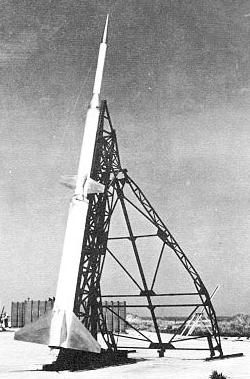
Home - Search - Browse - Alphabetic Index: 0- 1- 2- 3- 4- 5- 6- 7- 8- 9
A- B- C- D- E- F- G- H- I- J- K- L- M- N- O- P- Q- R- S- T- U- V- W- X- Y- Z
Exos sounding rocket
 Exos |
AKA: Exos;PWN-4. Status: Retired 1965. First Launch: 1958-06-26. Last Launch: 1965-11-02. Number: 10 . Thrust: 365.00 kN (82,055 lbf). Gross mass: 2,600 kg (5,700 lb). Height: 12.90 m (42.30 ft). Diameter: 0.58 m (1.90 ft). Apogee: 600 km (370 mi).
The Exos sounding rocket was developed by the University of Michigan under a contract from the Air Force Cambridge Research Center. The three fins of the Nike booster had to be replaced by four new clipped-delta fins. First flight test of an all-up Exos rocket occurred in June 1958. Exos was zero-launched from a rail launcher.
Historical Essay © Andreas Parsch
University of Michigan RM-86-PWN-4 Exos
The Exos sounding rocket was developed by the University of Michigan with the assistance of NACA under a contract from the Air Force Cambridge Research Center (AFCRC). It was a three-stage rocket combining an M6 Honest John (see M31-MGR-1A) first stage, an M5 Nike Ajax (see SAM-A-7-MIM-3) second stage and a Thiokol XM19 Recruit as third stage. The three fins of the Nike booster had to be replaced by four new clipped-delta fins. The Exos is very similar, but not identical to the Aerolab Co. Argo C-1, which used the same combination of rockets, but a slightly different aerodynamic design. The first flight test of an all-up Exos rocket occurred in June 1958.
After zero-launch from a specially built rail launcher, the first stage burned for about 4.4 seconds, after which it was separated from the vehicle by aerodynamic drag. After 25 seconds of coasting, the second stage fired for about 3 seconds, followed by separation and almost immediate firing of the third stage for further 1.6 seconds. The third stage and payload nose cone then continued to coast to an apogee of about 480 km (300 miles) (for a 23 kg (50 lb) payload).
In April 1959, the USAF allocated the formal research missile designation XRM-86 to the Exos at the request of the AFCRC, and in June 1963 this designation was changed to PWN-4A. At least eight research flights of XRM-86-PWN-4A vehicles were launched from Eglin AFB between February 1960 and November 1965, mostly with ionosphere research experiments as payload.
SpecificationsNote: Data given by several sources show slight variations. Figures given below may therefore be inaccurate!
Data for PWN-4A:
| Length | 12.94 m (42 ft 5.5 in) |
| Diameter | 1st stage: 58.2 cm (22.9 in); 2nd stage: 41.9 cm (16.5 in); 3rd stage: 22.9 cm (9.0 in) |
| Finspan | 1st stage: 2.59 m (8 ft 6 in) |
| Weight | 2660 kg (5870 lb) |
| Speed | 11300 km-h (7040 mph) |
| Ceiling | 480 km (300 miles) |
| Propulsion | 1st stage: Hercules M6 solid-fueled rocket; 404 kN (91000 lb) for 4.4 s 2nd stage: Allegheny Ballistics Lab. X216A2 solid-fueled rocket; 246 kN (55000 lb) for 3 s 3rd stage: Thiokol TE-289 (XM19) Recruit; 167 kN (37600 lb) for 1.6 s |
[1] Frederick I. Ordway III, Ronald C. Wakeford: "International Missile and Spacecraft Guide", McGraw-Hill, 1960
[2] Norman J. Bowman: "The Handbook of Rockets and Guided Missiles", Perastadion Press, 1963
[3] Department of Defense Missile Nomenclature Records
[4] "Sounding Rocket Study of Eighteen Vehicles, Summary Report", NASA, 1961
More at: Exos sounding rocket.
Family: pad-launched. Country: USA. Launch Sites: Wallops Island, Eglin. Stages: M-6, M5E1, Yardbird. Agency: Michigan. Bibliography: 2, 563.
1958 June 26 - . Launch Site: Wallops Island. LV Family: Honest John. Launch Vehicle: Exos sounding rocket.
1958 September 25 - . Launch Site: Wallops Island. LV Family: Honest John. Launch Vehicle: Exos sounding rocket.
1960 February 19 - . 17:18 GMT - . Launch Site: Eglin. LV Family: Honest John. Launch Vehicle: Exos sounding rocket. FAILURE: Failure.
1961 August 11 - . 14:30 GMT - . Launch Site: Eglin. LV Family: Honest John. Launch Vehicle: Exos sounding rocket.
1962 August 3 - . 17:46 GMT - . Launch Site: Eglin. LV Family: Honest John. Launch Vehicle: Exos sounding rocket.
1962 October 25 - . 06:00 GMT - . Launch Site: Eglin. LV Family: Honest John. Launch Vehicle: Exos sounding rocket.
1963 July 25 - . 22:38 GMT - . Launch Site: Eglin. LV Family: Honest John. Launch Vehicle: Exos sounding rocket.
1965 May 25 - . 23:20 GMT - . Launch Site: Eglin. LV Family: Honest John. Launch Vehicle: Exos sounding rocket.
1965 May 26 - . 23:20 GMT - . Launch Site: Eglin. LV Family: Honest John. Launch Vehicle: Exos sounding rocket.
1965 November 2 - . 20:00 GMT - . Launch Site: Eglin. LV Family: Honest John. Launch Vehicle: Exos sounding rocket.
Back to top of page
Home - Search - Browse - Alphabetic Index: 0- 1- 2- 3- 4- 5- 6- 7- 8- 9
A- B- C- D- E- F- G- H- I- J- K- L- M- N- O- P- Q- R- S- T- U- V- W- X- Y- Z
© 1997-2019 Mark Wade - Contact
© / Conditions for Use